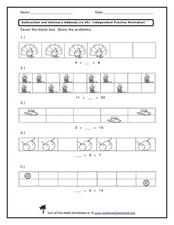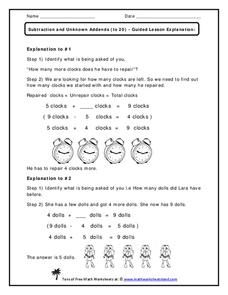Curated OER
Ordering to 20
Given a series of number lines, learners fill in missing number from 1-20 using the number pool provided. They add each number untill the number line is complete. This is a great activity to foster counting skills, number ordering, and...
Curated OER
Missing Numbers to Twenty
Which number is missing? Beginning counters examine twenty-six number sequences, one for each letter of the alphabet. Each sequence has four numbers, ranging from one to 20. There is one number missing from the sequence, and learners...
Curated OER
Addition Number Chart
Number charts are a great way for learners to practice counting and observe number patterns. There are four charts here with missing numbers for scholars to fill out. Each contains some numbers filled in as reference. Challenge...
Curated OER
Combinations to 20
Ten frames are a great way to help visualize simple math problems, evidenced in this clear and concise word problems worksheet. Each question features two ten frames for learners to use as they solve. All numbers are 20 or less....
Curated OER
Unknown Addends (to 20): Count the Blank Boxes
By filling in the blank squares, learners complete five addition number sentences both visually and numerically. For each problem, a frame is filled with a certain number of images (turkeys, candles, etc.) and a certain number of blank...
Curated OER
Counting Houses 1-20
What if your pre-k or kinder class was learning about dwellings or houses and you needed a house themed counting activity? You'd just need to click on this link and download this house themed slide-show. It shows numbers 1-20 alongside...
Curated OER
How many can you count?
Counting objects up to 16 can be cute and fun. Kids count objects as they appear on the screen, bouncing apples, racing cars, and pop up puppies make this a charming addition to your early learning math tool chest.
Curated OER
Subtraction and Unknown Addends
The missing addend strategy is helpful to young mathematicians approaching subtraction. This worksheet walks learners through the required steps, solving the problems with them. They examine situations with one addend and a sum provided,...









